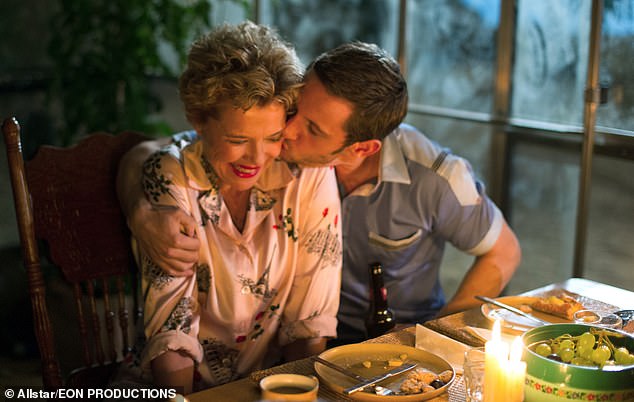My widowed grandmother is quite young at heart for a 77 year old and she is dating a 41 year old man.
She is happy and says he is not after her money, but as a family, we are terrified. My grandfather left her comfortably and we fear that she will be fleeced and left destitute. Or her boyfriend may be after our inheritance, which would be substantial.
My parents want to stage an intervention, while her three adult grandchildren (including me) think it might alienate her and never speak to us again. We don’t know what to do, what do you think?
CW Edinburgh
Annette Bening and Jamie Bell star in Don’t Get Old in Liverpool, about a woman’s romance with a much younger man
Money psychotherapist Vicky Reynal responds: It is understandable that you are worried and want to protect your grandmother from possible manipulation. I don’t think this is an either/or situation, as you either intervene or you don’t say anything.
I think you’re right: an “intervention” that involves the entire family exposing a strong point could make her feel attacked and, as you say, alienate her. This requires a more delicate conversation, with perhaps one or two family members approaching her.
The language should be tentative and not accusatory (“you’re naive” or “he’s after your money”) so that she isn’t left in a defensive position from the start. You want to convey to your grandmother that, to take care of her, you must make sure that she takes care of her finances and does not expose herself to unintentionally giving away more than she is comfortable with. This is different than saying “he’s scamming you” or “he’s taking advantage of you.” It’s tempting to make forceful statements if we don’t feel heard, but you run the risk of having the opposite effect.
You could use the third person to inform your grandmother about scenarios she might consider, ‘it’s not uncommon for people to start using their partner’s credit card without their knowledge’ or perhaps ‘there are professionals who can advise you.’ about the best way’. way to protect your finances.
Let’s be clear: You’re obviously implying that you feel your partner might have exploitative intentions, but it’s still a gentler way to be direct than making accusations that might be unfounded.
But listen too. Your grandmother may have considered all of the above and already addressed it in one way or another. Perhaps you have already taken precautions, or perhaps you have idealized this man and deny the risks. It is also possible that you are fully aware of the risks and still want to live this romance and enjoy the happiness and companionship it brings you now, knowing that if there are consequences you will face them in the future.
Ideal? No, but ultimately the choice is yours.
In fact, that could be the real reason all of this is happening: as we age and worry about the possible loss of autonomy that comes with aging mind and body, she could be making a strong statement to the family about the fact that she still has options and decision-making in her life and is not ready to give that up. This young boyfriend could be a way for him to hold on to his youth and his freedom.
If your grandmother wants to leave her entire inheritance to her younger boyfriend, that’s her prerogative. You and the rest of the family may find it scandalous and feel robbed and angry about it, but we all have the right to make our decisions, even if it means having to live with the consequences. For the family, it is about finding a balance between making them aware of some risks without becoming controlling or critical.
Do you have any questions for Vicky Reynal? Email vicky.reynal@dailymail.co.uk


